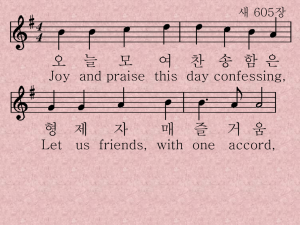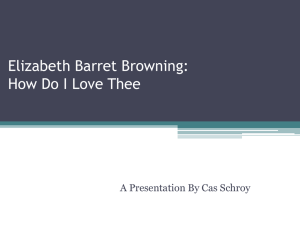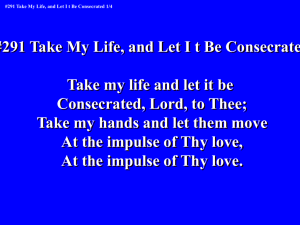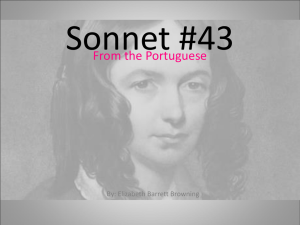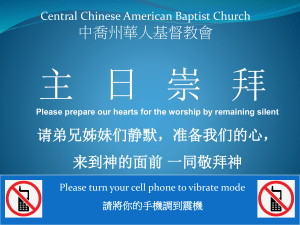Sonnet 43 analysis
advertisement
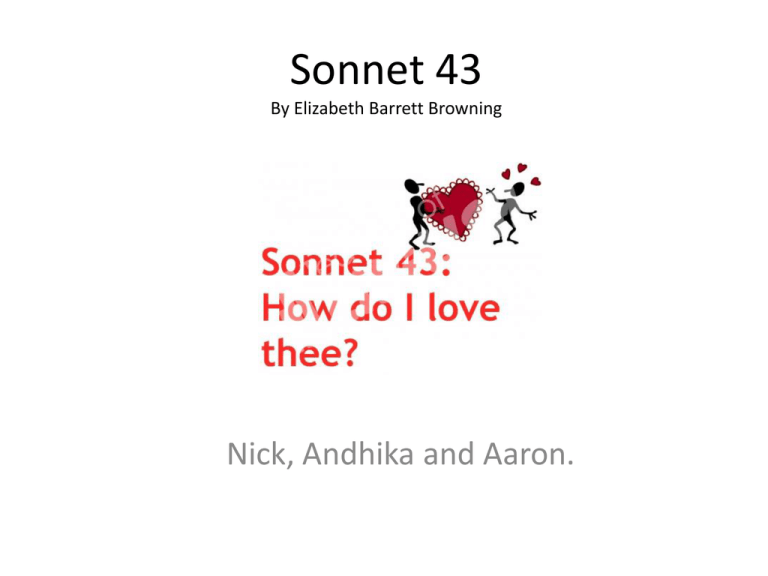
Sonnet 43 By Elizabeth Barrett Browning Nick, Andhika and Aaron. Elizabeth Browning • Elizabeth Barrett Browning • Born(1806-03-06)6 March 1806 Kelloe, Durham, England • Died29 June 1861(1861-06-29) (aged 55) Florence, Italy Sonnet 43 How do I love thee? Let me count the ways. I love thee to the depth and breadth and height My soul can reach, when feeling out of sight For the ends of being and ideal grace. I love thee to the level of every day's Most quiet need, by sun and candle-light. I love thee freely, as men strive for right. I love thee purely, as they turn from praise. I love thee with the passion put to use In my old griefs, and with my childhood's faith. I love thee with a love I seemed to lose With my lost saints. I love thee with the breath, Smiles, tears, of all my life; and, if God choose, I shall but love thee better after death. Summary • She is trying to describe the abstract feeling of love by measuring how much her love means to her. She also expresses all the different ways of loving someone and she tells us about her thoughts around her beloved. The tone of the poem is deep, in a loving way. Literary Devices used • The dominant figure of speech in the poem is anaphora: the use of I love thee in eight lines and I shall but love thee in the final line. This repetition builds rhythm while reinforcing the theme. (Anaphora) – It is a type of expression whose reference depends on another referential element. • E.g., in the sentence 'Sally preferred the company of herself', 'herself' is an anaphoric expression in that it is coreferential with the expression in subject position Alliteration • thee, the (Lines 1, 2, 5, 9, 12). thee, they (Line 8) soul, sight (Line 3) love, level (Line 5) quiet, candle-light (Line 6) freely, strive, Right (Line 7) purely, Praise (Line 8) passion, put (Line 9) my, my (Line 10) love, love (Line 11) With, with (Line 12) lost, love (Line 12) but, better (Line 14) These repetitions build rhythm while reinforcing the theme. Significance of the poem “Thee” -Refers to the poets husband, Robert Browning When . . . Grace: -when my soul feels its way into the spiritual realm (out of sight) -to find the goal of being alive and living uprightly By sun and candlelight -refers to night and day Significance of the poem • Freely: she loves him willingly—and just as intensely as men who fight for freedom • purely: she loves him genuinely, without desire for praise. • with . . . saints: with a childlike fervor for saints and holiness that I seemed to lose when I grew older. • Smiles . . . life: their love is perhaps too sentimental • I shall love the better after death – this implies that their love is eternal, never ending THE END
